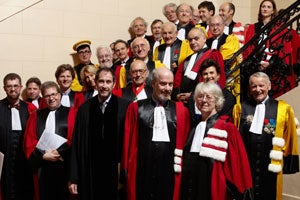Duncan Kennedy, Carter Professor of General Jurisprudence at Harvard Law School, has received an honorary degree from Sciences Po in Paris.
Kennedy, whose scholarship has focused on juridical thought, economic analysis of the law, the links between law and literary theory, and legal globalization—among many other topics—is the first law professor to receive an honorary doctorate from Sciences Po.
“Recognized as one of the founding members of the Critical Legal Studies movement in the United States, author of numerous works of enormous education value in all areas of law, Duncan Kennedy is an intellectual who has had a profound influence on the evolution of American legal thought and the way it is taught,” said Christophe Jamin, director of the Sciences Po Law School, in a speech honoring Kennedy during the awards ceremony on Dec. 7.
HLS Dean Martha Minow said, “Globally as well as locally, Duncan Kennedy is a towering figure in legal scholarship and it’s terrific to see him recognized with this prestigious honor.”
Kennedy received the title of Doctor Honoris Causa along with one other recipient, Helen Wallace, emeritus professor at the European Institute of the London School of Economics and Political Science.
Jean-Claude Casanova, president of the Fondation Nationale des Sciences Politique, said, “Sciences Po has chosen to distinguish two internationally renowned academics, Helen Wallace and Duncan Kennedy, whose work in the fields of law and political science have considerably influenced the scientific and academic world, and whose commitment has nourished political reflection.”
Wallace and Kennedy are the 17th and 18th persons to receive honorary doctoral degrees from Sciences Po. Others include Italian Prime Minister Mario Monti and Columbia Professor Edmund S. Phelps, winner of the 2006 Nobel Prize in Economics, in 2005; the late Vaclav Havel, playwright and former Czech president, in 2009; and former President of Brazil Luiz Inácio Lula Da Silva, in 2011.
In an interview after the awards ceremony with a Ph.D. student from Sciences Po Law School, Kennedy said receiving the honorary doctorate was a thrilling event for him. “Because of my long deep involvement with Sciences Po, I’ve been very much influenced by French Critical Theory from early on in my career.”
Watch the interview:
Earlier this year, Harvard Law School and Sciences Po Law School launched a wide-ranging program that includes exchanges of faculty and students (both pre-doctoral and post-doctoral), and co-sponsorship of joint conferences on U.S. and European legal issues. SPLS is also a co-sponsor of the doctoral workshop of Harvard’s Institute for Global Law and Policy.
Under the new partnership, faculty from each school participate in short-term exchanges for up to two weeks, giving lectures, discussing topics of common interest with contemporaries, or conducting research. Longer-term faculty exchanges will also be considered, in the hopes of fostering collaborative teaching, research, conferences and mentoring relationships.
On June 13, Harvard and SPLS co-sponsored a one-day conference entitled “Franco-American Legal Influence, Then and Now.” The conference, which took place at Harvard, explored historical and contemporary moments of intellectual influence and reception between French and U.S. legal thought.
Sciences Po was established in 1872 and is France’s leading university for social sciences. In 2009, SPLS was created in order to train lawyers with an emphasis on critical thinking and creativity, as well as to equip them to play leadership roles in the worlds of both law and business.
